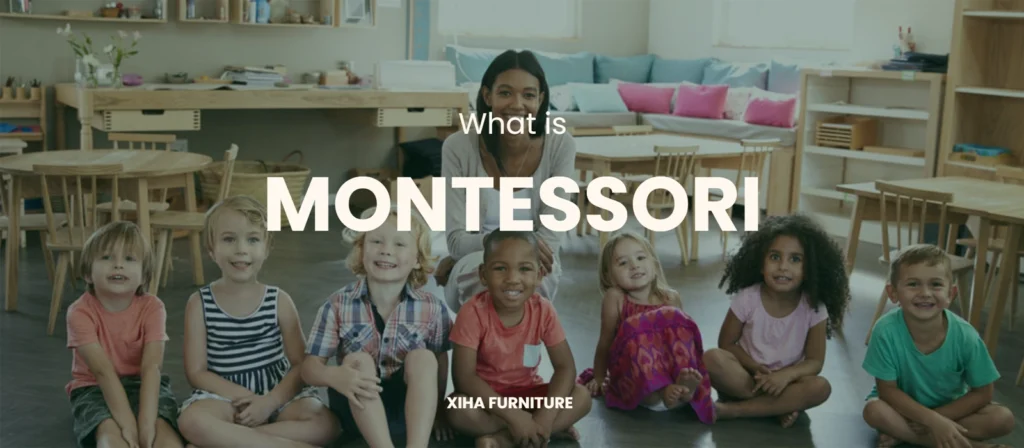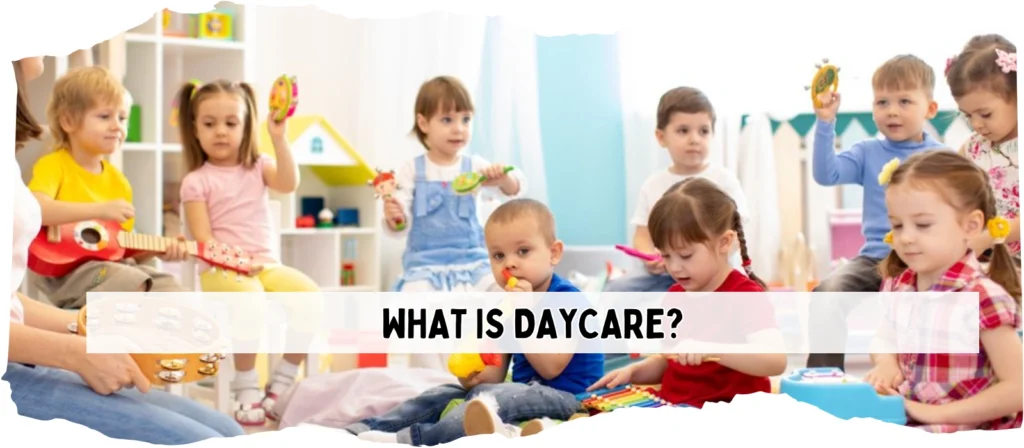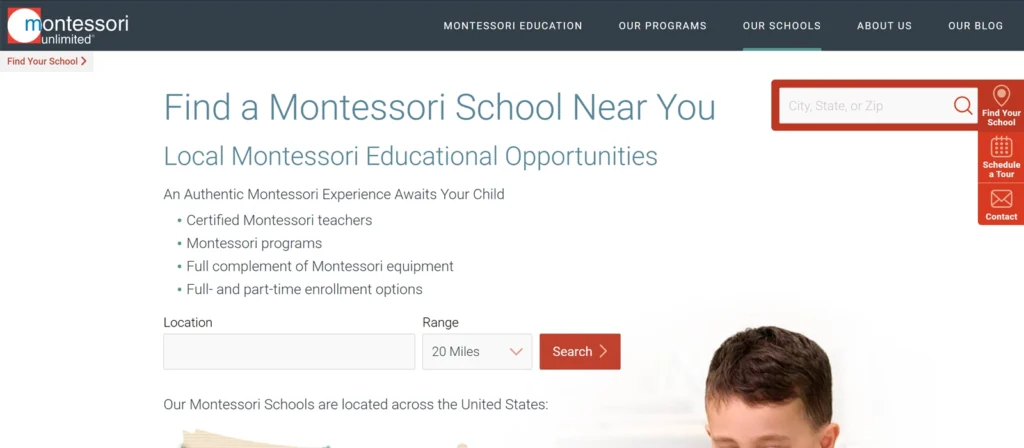Are you feeling overwhelmed about deciding between Montessori vs daycare for your little one? Wondering if your child will miss out if you choose the wrong path? Worried about whether your choice will impact their development, independence, or confidence? You’re not alone—this is one of the most important decisions you’ll make as a parent.
Montessori vs daycare isn’t just a question of cost or convenience—it’s about giving your child the best foundation for a lifetime of learning and emotional growth. Understanding the differences helps you align your parenting goals with an early education style that nurtures your child’s unique personality and developmental needs.
This guide breaks it all down so you can make an informed, confident decision that sets your child up for success in both school and life.

What is Montessori?
The Montessori method is a globally respected educational philosophy developed by Dr. Maria Montessori over a century ago. At its core, Montessori education emphasizes child-led learning, independence, and respect for a child’s natural development. Rather than traditional classroom instruction, Montessori classrooms are set up as carefully prepared environments that empower children to choose their own activities and progress at their own pace.
The approach is structured yet flexible. Children are free to move about the classroom, explore hands-on materials, and engage in tasks that develop both cognitive and life skills. Teachers act not as lecturers, but as guides or facilitators, quietly observing and supporting the child’s individual learning journey.
Montessori classrooms typically include mixed-age groups, which allow younger children to learn from older peers and older children to reinforce their knowledge by teaching others. The curriculum spans key areas such as practical life, sensorial development, mathematics, language, and cultural studies—all presented through tangible, real-world materials.
For example, in the practical life area, a child may spend time pouring water from one jug to another or learning how to tie their shoes. These simple exercises build hand-eye coordination, focus, and confidence. In the math section, children might explore number concepts using bead chains or number rods—concrete tools that make abstract ideas easier to grasp.
Many high-quality institutions, such as the Montessori Academy of Colorado, Pinebrook Montessori Daycare, and Bright Minds Montessori, adhere to Association Montessori Internationale (AMI) or American Montessori Society (AMS) standards to ensure program integrity.
Studies have shown that Montessori students often demonstrate stronger executive function, social-emotional skills, and academic performance in the long term compared to peers in conventional systems.
In essence, Montessori is not just an education model; it’s a way of thinking about childhood—one that sees children as capable, curious individuals and nurtures their independence from a very young age.

What is Daycare?
Daycare, also known as childcare, refers to a supervised environment where young children are cared for during the day, typically while parents are at work. It caters to children from infancy through age five or six and may operate in home-based settings, commercial centers, or nonprofit organizations. Unlike Montessori, daycare programs vary widely in structure, curriculum, and educational emphasis.
Most daycare centers focus on basic care routines—feeding, napping, playtime, and social interaction. Some incorporate early learning components, especially those aligned with pre-kindergarten readiness, but the primary goal remains supervision and custodial care.
A key distinction is that daycare centers often group children by age and follow a rigid daily schedule, with planned blocks for eating, naps, and play. Teachers or caregivers guide children through structured group activities, circle time, songs, or story sessions. However, the depth of learning typically does not match the individualized, materials-based exploration found in Montessori classrooms.
Facilities like Mar Vista Montessori & Infant Care Center or Eureka Montessori Childcare combine elements of both models, offering structured care with some Montessori-inspired activities. However, such centers may not follow authentic Montessori pedagogy or hold formal accreditation.
The affordability and accessibility of daycare make it a preferred option for many families. According to ChildCare.gov, the average cost of full-time daycare in the U.S. can range from $600 to $1,200 per month, depending on location and services offered. In contrast, full-time Montessori programs can range from $1,000 to $2,500 or more.
For working parents who need flexible hours, convenient locations, or budget-conscious options, daycare offers a practical solution. It is especially beneficial for families seeking peer interaction, consistent care, and supervised play for their children.
Ultimately, while daycare prioritizes safety, group activities, and routine, it may not offer the same level of intentional developmental guidance that defines the Montessori method.
The Core Differences Between Montessori vs Daycare
When comparing Montessori vs daycare, the differences go far beyond classroom decoration or tuition cost. They reflect two distinct approaches to early childhood development, each with strengths depending on your child’s temperament and your family’s priorities.
Montessori education is designed to support a child’s natural drive to learn. The method encourages independence, concentration, and intrinsic motivation. A Montessori classroom offers choice, autonomy, and uninterrupted work periods that allow children to explore subjects at their own pace. These experiences nurture deep focus, self-discipline, and problem-solving skills.
In contrast, daycare environments typically operate on a fixed schedule, with structured blocks for meals, naps, play, and teacher-led activities. This routine can be reassuring for some children and offers a dependable rhythm for parents with demanding schedules. However, it often leaves little room for spontaneous exploration or deep engagement with materials.
Another major difference in the Montessori vs daycare comparison is how teachers interact with children. In Montessori settings, teachers observe more than they intervene, encouraging children to find answers themselves. In daycares, educators often direct the flow of activities, aiming for consistency and group participation.
The physical environment also sets the two apart. Montessori classrooms use child-sized furniture, natural materials, and purposeful tools that resemble real-life objects. Daycare centers are often filled with plastic toys, bright colors, and general play equipment aimed at keeping children entertained.
Additionally, Montessori programs typically group children in multi-age classrooms (e.g., 3 to 6 years), which promotes peer learning and community building. Daycares, by contrast, usually organize children by age for simplicity and schedule consistency.
Both approaches aim to support healthy development, but the Montessori model offers a more education-centric path, while daycare offers broader accessibility and flexibility.
If you’re comparing Montessori vs daycare, consider these aspects:
- Learning style (child-led vs teacher-led)
- Structure (flexible vs scheduled)
- Social environment (mixed-age vs same-age)
- Curriculum depth (academic integration vs basic care)
Each of these factors plays a significant role in shaping your child’s learning experience and long-term development.
Summary Table: Montessori vs Daycare at a Glance
| Feature | Montessori | Daycare |
|---|---|---|
| Educational Philosophy | Child-led learning and independence | Supervised care and structured routine |
| Teacher Role | Guide and observer | Instructor and activity leader |
| Classroom Setup | Prepared, natural, minimal environment | Colorful, toy-focused, functional |
| Age Grouping | Mixed-age groups | Same-age grouping |
| Curriculum Focus | Academic and life skills | Basic care and play |
| Daily Structure | Flexible, individualized schedule | Fixed, group-oriented schedule |
| Social Development | Peer mentoring, collaboration | Peer interaction within age group |
| Tuition Cost | Higher (varies by region) | More affordable on average |
| Developmental Goals | Independence, focus, real-world skills | Socialization, safety, routine |
Cost Comparison: Montessori vs Daycare
One of the most commonly asked questions by parents researching Montessori vs daycare is: how much does each option really cost, and what value does it provide? While pricing can vary greatly based on region, program type, and facility reputation, there are consistent trends worth understanding before you make a decision.
Montessori tuition is generally higher than daycare costs due to several factors. These include highly trained staff, specialized learning materials, low teacher-to-child ratios, and purposefully designed classrooms. According to the National Center for Education Statistics, the average cost of Montessori programs in the U.S. ranges from $1,000 to $2,500 per month depending on location and age group.
In contrast, the cost of daycare is typically lower, ranging from $600 to $1,200 per month. Daycare programs often have higher student-to-caregiver ratios and fewer specialized educational resources, which helps reduce overhead costs. For parents on a tight budget, this can make daycare a more practical and accessible choice.
However, choosing between Montessori vs daycare isn’t just about tuition. Parents should also consider the value behind the price. Montessori classrooms focus on holistic development—addressing cognitive, emotional, and motor growth in a unified way. The materials are scientifically designed to develop real-world problem-solving skills, independence, and self-regulation.
On the other hand, many daycares prioritize safety, consistency, and play. While this works well for certain families and age groups, it may not provide the same depth of individualized learning as a Montessori classroom.
Parents can also explore hybrid options like Montessori-inspired daycares, which offer elements of Montessori within a more traditional daycare framework. Examples include programs like Eureka Montessori Childcare and Bloom Montessori Longmont. These can be a good compromise between affordability and educational quality.
When evaluating cost, also consider hidden or long-term benefits. Montessori-educated children often transition more easily to formal schooling and may require less academic remediation in the future. These benefits, though not immediate, contribute to a strong return on your educational investment.
In summary, the cost difference between Montessori vs daycare is notable—but so is the difference in what each model delivers.
Tuition and Value Comparison Table
| Cost Element | Montessori | Daycare |
| Average Monthly Tuition | $1,000–$2,500 | $600–$1,200 |
| Staff-to-Child Ratio | Lower ratios (more individualized care) | Higher ratios (larger groups) |
| Teacher Training | Certified Montessori educators | Varies; may not require specialized training |
| Learning Materials | Specialized Montessori tools | General toys and activity kits |
| Long-Term Development | Focus on independence and cognitive growth | Emphasis on safety, play, and routine |
| Flexibility and Schedule | Flexible, self-paced routines | Structured, time-based activities |
Real Locations Case Study: Montessori vs Daycare Across the U.S.
To better understand the practical differences between Montessori vs daycare, it helps to look at real-world institutions. Across the United States, a variety of Montessori schools and daycare centers provide examples of how these models operate in daily practice.
For instance, Philly Montessori in Pennsylvania is known for its authentic Montessori environment, small class sizes, and strong bilingual program. Their classrooms reflect the classic Montessori aesthetic—natural lighting, uncluttered spaces, and shelves filled with hands-on learning tools. Teachers are certified through the American Montessori Society and follow a consistent developmental model.
On the other hand, Grand Lake Montessouri Daycare in Colorado integrates some Montessori principles but operates more like a traditional daycare. The structure includes a more rigid schedule, greater adult direction, and more frequent group transitions throughout the day. While children do participate in themed learning units, the approach leans toward structured care rather than open-ended exploration.
Bloom Montessori in Longmont, Colorado, offers a full implementation of the Montessori model, including a rich sensorial curriculum, practical life activities, and multi-age classrooms. Meanwhile, daycare options in the same city might focus more on convenience, cost savings, and flexible drop-off hours to accommodate working parents.
Santa Clara Montessori in California delivers an excellent example of what sets Montessori apart: they provide individualized education plans for each child, mixed-age collaboration, and an integrated global curriculum. These are features that most daycares, due to staffing and structure, often cannot replicate.
A comparison like Montessori vs daycare becomes especially meaningful when examined through real-world execution. Each school or center reflects the values behind its model, and understanding those values can help you find the best fit for your family.
To explore schools near you, try using the Montessori School Locator or browse reviews on GreatSchools.org.
How to Choose Between Montessori vs Daycare
When choosing between Montessori vs daycare, the goal isn’t just to select a school—it’s to find the environment where your child will feel safe, inspired, and empowered to grow.
Consider Your Child’s Personality
After exploring the core differences between Montessori vs daycare, the next challenge is determining which path is right for your child. There is no universally correct answer—only the best fit based on your family’s unique circumstances, values, and long-term educational goals.
Begin by assessing your child’s natural preferences and personality traits. Does your child enjoy working independently, solving problems, and exploring quietly? Or do they prefer a highly social environment with frequent teacher interaction and clear routines? Montessori classrooms offer autonomy and deep focus, while daycare settings typically favor consistency, peer bonding, and guided play.
Evaluate Your Family’s Schedule
Montessori programs often operate on school-based calendars with limited holiday care. If your family requires early drop-off, late pick-up, or full-year availability, daycare might better accommodate your work schedule and logistics.
Compare Tuition and Long-Term Investment
Montessori tuition tends to be higher due to specialized materials and teacher training. If you’re planning a multi-year commitment, calculate how the annual cost aligns with your family’s financial goals. Daycare is usually more affordable, especially for part-time care or subsidized programs.
Visit and Observe in Person
School visits reveal much more than websites. Look for calm engagement in Montessori classrooms and warm supervision in daycares. Ask about staff turnover, student-teacher ratios, and how children are supported emotionally during transitions.
Align with Your Educational Philosophy
If you value independence, hands-on learning, and character development, Montessori may be ideal. If you prioritize affordability, community convenience, and flexible routines, daycare could serve your child equally well during early years.
Availability: How to Find Montessori Childcare Near You
Finding quality early childhood education options is a top concern for parents comparing Montessori vs daycare. Fortunately, there are many tools and strategies available to help you locate the best fit for your family’s needs and location.

Search Smart with Local and National Tools
Start by using online search engines with relevant keywords like “montessori childcare near me” or “daycare montessori near me.” You can also use specialized directories such as the Montessori School Locator, GreatSchools.org, or NAEYC’s Accredited Program Search.
These tools can help you narrow your options based on city, zip code, or school rating. For example, many parents searching for “montessori day care near me” discover excellent programs such as Centre Square Montessori Schoolhouse in Canada or Montessori Cedar Park in Texas.
Visit and Verify Before Enrolling
Once you’ve identified a few Montessori vs daycare candidates, schedule in-person tours. Speak directly with school administrators to understand the curriculum, observe class interactions, and ask about credentials, safety protocols, and teacher qualifications.
Look for Montessori programs with AMS or AMI certification and daycares that are state-licensed with good parent reviews. Authentic Montessori schools will have prepared environments and hands-on materials, while quality daycares offer structured safety, group activities, and clean play spaces.
Consider Waitlists and Enrollment Timing
Many Montessori schools, especially in urban or high-demand areas, operate on strict enrollment timelines and may have long waitlists. Begin your search early—ideally 6–12 months in advance. Daycares, while often more flexible, can also fill up quickly in popular neighborhoods.
To improve your chances of getting into your top choice—whether Montessori or daycare—prepare documents ahead of time, attend open houses, and stay in contact with admissions staff.
When evaluating availability, the key is starting early, doing thorough research, and staying flexible. Whether you’re looking for a full-time Montessori preschool or a neighborhood daycare center with extended hours, your proactive approach will pay off.
Common Misunderstandings About Montessori vs Daycare
Despite the growing awareness of both educational approaches, many misconceptions still circulate about Montessori vs daycare. These misunderstandings can lead parents to dismiss a model that might actually fit their child’s needs best.

Misconception 1: Montessori is Only for the Gifted or Wealthy
One of the most common myths is that Montessori is only suitable for high-achieving children or affluent families. In reality, Montessori was originally designed for children from underserved communities. Today, Montessori schools exist in a wide range of settings—including public, charter, and nonprofit centers. While tuition can be higher than daycare, many programs offer scholarships or sliding-scale fees.
Misconception 2: Daycare is Just Babysitting
Daycare is often misunderstood as being purely custodial, lacking educational value. While some daycare centers focus on supervision and safety, many also incorporate structured learning activities, social-emotional development, and pre-academic skills. A high-quality daycare can offer a nurturing environment with professional caregivers who follow early childhood development best practices.
Misconception 3: Montessori Lacks Structure
Another frequent concern is that Montessori classrooms are too unstructured. This stems from a misunderstanding of what structure looks like in the Montessori method. While children do have freedom of choice, the environment is highly organized, and activities are carefully sequenced. The structure comes from routine, consistency, and self-directed engagement—not external control.
Misconception 4: Daycare Doesn’t Support Learning
When comparing Montessori vs daycare, some parents assume only Montessori supports early education. In truth, many daycare programs now integrate elements of early literacy, STEM activities, and hands-on learning. Some even adopt Montessori-inspired components while maintaining the affordability and schedule flexibility of traditional daycare.
Understanding these misconceptions is crucial to making an informed choice. Whether you choose Montessori or daycare, ensure your decision is based on accurate, experience-backed information rather than assumptions.
Parent Testimonials and Expert Opinion
One of the most insightful ways to evaluate Montessori vs daycare is by hearing directly from parents and educators who have firsthand experience with each model. These real voices offer practical perspectives that can guide your own decision-making process.
Parent Experiences with Montessori
Parents whose children attend Montessori programs often highlight the remarkable independence and focus their children develop. One parent from Santa Clara Montessori shared, “We chose Montessori because our daughter was shy and sensitive. Within a few months, she began speaking up, choosing her own activities, and even helping with tasks at home.”
Another parent from Montessori Cedar Lane explained, “What impressed us about Montessori was how our son learned to read and do math at his own pace without pressure. The environment felt calm and purposeful—very different from the daycares we visited.”
Daycare Parent Perspectives
On the daycare side, many families value the convenience, affordability, and consistent care. A mother in Leesburg, whose twins attend a local daycare, said, “We needed full-day coverage with flexible hours. Our daycare not only offers that, but our children love the group play, music time, and new friends.”
A father in Austin added, “We considered Montessori, but the cost and limited hours didn’t work for us. Our daycare has a great curriculum and kind staff. It’s been a fantastic bridge to kindergarten.”
Expert Educational Insights
Child development experts also weigh in on the Montessori vs daycare comparison. According to Dr. Karen Mills, an early childhood specialist, “Montessori environments can foster stronger executive functioning skills, while quality daycare promotes emotional resilience through social immersion. Both have strengths—it depends on the fit.”
Educator testimonials support the idea that neither model is inherently superior; rather, the success of Montessori vs daycare depends on alignment with each child’s learning style and the quality of implementation at a given school.
Whether you’re drawn to the independence-building structure of Montessori or the social familiarity of daycare, parent and expert voices alike reinforce the value of choosing thoughtfully, based on evidence and personal fit.
Conclusion
Choosing between Montessori vs daycare is more than just a logistical decision—it’s a long-term investment in your child’s development, independence, and future learning capacity. As we’ve seen throughout this guide, both models offer meaningful benefits, but they serve different needs.
If you value autonomy, hands-on learning, and an environment designed for exploration and growth, Montessori may be the right path. If affordability, convenience, and social interaction are your top priorities, daycare offers a supportive and structured environment that nurtures children in different but equally important ways.
At XIHA Furniture, we understand the unique needs of both Montessori vs daycare settings. That’s why we provide high-quality, affordable preschool furniture designed for safety, function, and style. Whether you’re starting a Montessori program or equipping a daycare center, we’re here to help.
Explore our full catalog and request a quote at xihafurniture.com to support your learning space today.



